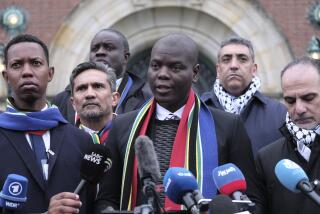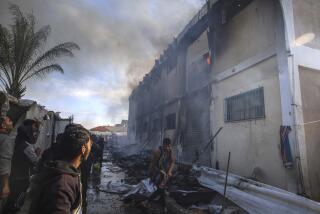Bring the Khmer Rouge Before an International Tribunal
Some people do have staying power, especially monstrous ones. It was just about a year ago that news items flashed around the world reporting the death of Pol Pot. Some newspapers even published obituaries, only to have Pol Pot surface again.
On Wednesday, Pol Pot reportedly surrendered to defectors from his Khmer Rouge movement, and his former comrades said they would ask for an international tribunal to try him. However, on Thursday, the high-ranking general who had announced the capture reversed himself and said Pol Pot was still on the run.
Should Pol Pot finally be caught, what are the chances that he will be tried in an international tribunal rather than a Cambodian one?
There are compelling reasons for the Cambodian government to see Pol Pot tried before an international tribunal rather than a domestic one. The crimes that he has committed during his three-year reign of terror in the “Democratic Kampuchea” era (1975-1979) amounted to genocide as per the 1948 Convention on the Prohibition and Punishment of the Crime of Genocide to which Cambodia is a party.
Even though it did not amount to a formal juridical finding, a 1979 U.N. committee report stated that the human rights violations, including the mass killings of hundreds of thousands of people in Cambodia, was the “worst since the end of the Second World War.”
A verdict against Pol Pot and other Khmer Rouge leaders by an international tribunal would have more persuasive force morally and legally than any verdict from a domestic one. It would also stand as an example that crimes against international law do not always go unpunished.
Independent scholars from around the world, the United Nations, nongovernmental organizations and the Cambodian government have collected and documented monumental evidence of the crimes of the Khmer Rouge that would fall under the definition of genocide under the 1948 convention. There is overwhelming evidence of the Pol Pot-led Khmer Rouge’s intention as well as commission of genocide “to destroy in whole or in part, a national, ethnical, racial or religious group as such.”
But what about the technicalities of establishing such an international tribunal?
The genocide convention of 1948 mentioned the desirability of establishing a permanent International Criminal Court to try those who committed genocide “whether in times of peace or in times of war.” Fifty years later, there is still no such court and none in sight.
So the likely alternative is to try Pol Pot before an ad hoc international tribunal on Cambodia or to be more specific, an ad hoc tribunal for crimes committed during the Democratic Kampuchea period. There are precedents for this.
In 1993, the U.N. Security Council established an ad hoc tribunal to punish those who had committed “serious violations of international humanitarian law” in the former Yugoslavia. In 1994, the U.N. established a similar tribunal to try those responsible for the mass killings in Rwanda.
Some international lawyers have criticized these tribunals for lack of “international due process” in their establishment and questioned the competence of the United Nations to establish them. Some critics have said that the tribunals lack teeth and that the Yugoslavia and Rwanda tribunals do not go far enough since their statutes specifically exclude the death penalty.
But these criticisms should not deter the U.N. Security Council from establishing a tribunal in this case. Whether Pol Pot is finally caught, dead or alive, establishing a tribunal to try those responsible for the genocide in Cambodia would send a powerful message that crimes against international law and humanity would not go unacknowledged or unpunished.
More to Read
Sign up for Essential California
The most important California stories and recommendations in your inbox every morning.
You may occasionally receive promotional content from the Los Angeles Times.










